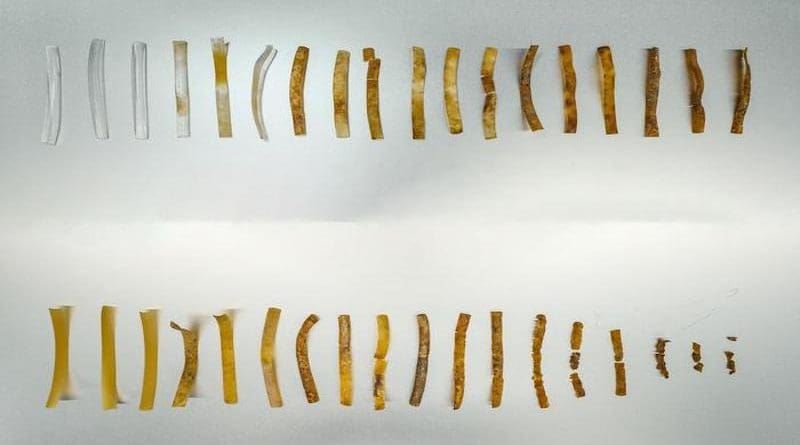Biodegradable ‘Living Plastic’ Houses Bacterial Spores That Help It Break Down
A new type of bioplastic could help reduce the plastic industry’s environmental footprint. Researchers led by the University of California San Diego have developed a biodegradable form of thermoplastic polyurethane (TPU), a soft yet durable commercial plastic used in footwear, floor mats, cushions and memory foam. It is filled with bacterial spores that, when exposed to nutrients present in compost, germinate and break down the material at the end of its life cycle.
The work is detailed in a paper published in Nature Communications.
The biodegradable TPU was made with bacterial spores from a strain of Bacillus subtilis that has the ability to break down plastic polymer materials.
“It’s an inherent property of these bacteria,” said study co-senior author Jon Pokorski, a nanoengineering professor at the UC San Diego Jacobs School of Engineering and co-lead of the university’s Materials Research Science and Engineering Center (MRSEC). “We took a few strains and evaluated their ability to use TPUs as a sole carbon source, then picked the one that grew the best.”
The researchers used bacterial spores, a dormant form of bacteria, due to their resistance to harsh environmental conditions. Unlike fungal spores, which serve a reproductive role, bacterial spores have a protective protein shield that enables bacteria to survive while in a vegetative state.
To make the biodegradable plastic, the researchers fed Bacillus subtilis spores and TPU pellets into a plastic extruder. The ingredients were mixed and melted at 135 degrees Celsius, then extruded as thin strips of plastic.
To assess the material’s biodegradability, the strips were placed in both microbially active and sterile compost environments. The compost setups were maintained at 37 degrees Celsius with a relative humidity ranging from 44 to 55%. Water and other nutrients in the compost triggered germination of the spores within the plastic strips, which reached 90% degradation within five months.
“What’s remarkable is that our material breaks down even without the presence of additional microbes,” said Pokorski. “Chances are, most of these plastics will likely not end up in microbially rich composting facilities. So this ability to self-degrade in a microbe-free environment makes our technology more versatile.”
Although the researchers still need to study what gets left behind after the material degrades, they note that any lingering bacterial spores are likely harmless. Bacillus subtilis is a strain used in probiotics and is generally regarded as safe to humans and animals—it can even be beneficial to plant health.
In this study, the bacterial spores were evolutionary engineered to survive the high temperatures necessary for TPU production. The researchers used a technique called adaptive laboratory evolution to create a strain that is resilient to extrusion temperatures. The process involves growing the spores, subjecting them to extreme temperatures for escalating periods of time, and allowing them to naturally mutate. The strains that survive this process are then isolated and put through the cycle again.
“We continually evolved the cells over and over again until we arrived at a strain that is optimized to tolerate the heat,” said study co-senior author Adam Feist, a bioengineering research scientist at the UC San Diego Jacobs School of Engineering. “It’s amazing how well this process of bacterial evolution and selection worked for this purpose.”
The spores also serve as a strengthening filler, similar to how rebar reinforces concrete. The result is a TPU variant with enhanced mechanical properties, requiring more force to break and exhibiting greater stretchability.
“Both of these properties are greatly improved just by adding the spores,” said Pokorski. “This is great because the addition of spores pushes the mechanical properties beyond known limitations where there was previously a trade off between tensile strength and stretchability.”
While the current study focused on producing smaller lab-scale quantities to understand feasibility, the researchers are working on optimizing the approach for use at an industrial scale. Ongoing efforts include scaling up production to kilogram quantities, evolving the bacteria to break down plastic materials faster, and exploring other types of plastics beyond TPU.
“There are many different kinds of commercial plastics that end up in the environment—TPU is just one of them,” said Feist. “One of our next steps is to broaden the scope of biodegradable materials we can make with this technology.”

